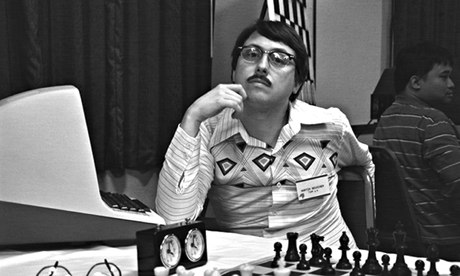
Computer Chess (2013) / Comedy
MPAA Rated: Not rated, but likely R for language, drug content, and sexual situations
Running Time: 92 min.Cast: Patrick Riester, Myles Paige, Gordon Kindlmann, Robin Schwartz, Gerald Peary, Wiley Wiggins, James Curry
Director: Andrew Bujalski
Screenplay: Andrew Bujalski
Review published March 13, 2014
 Computer Chess is a mumblecore
mockumentary (of sorts), set in the early 1980s at a budget hotel
hosting a convention for programmers of computer chess programs to
compete in a tournament against humans and other computer software
programs. Problems result when the chess convention must share space
with a New Age-y sex therapy convention that connects longtime couples
through emotional therapy. Another development occurs when one of the
programmers starts to think that his program changes its strategy
depending on whether it thinks it is playing a human or computer
opponent, and giving further hints that it may be far more advanced
than ever dreamed possible.
Computer Chess is a mumblecore
mockumentary (of sorts), set in the early 1980s at a budget hotel
hosting a convention for programmers of computer chess programs to
compete in a tournament against humans and other computer software
programs. Problems result when the chess convention must share space
with a New Age-y sex therapy convention that connects longtime couples
through emotional therapy. Another development occurs when one of the
programmers starts to think that his program changes its strategy
depending on whether it thinks it is playing a human or computer
opponent, and giving further hints that it may be far more advanced
than ever dreamed possible.